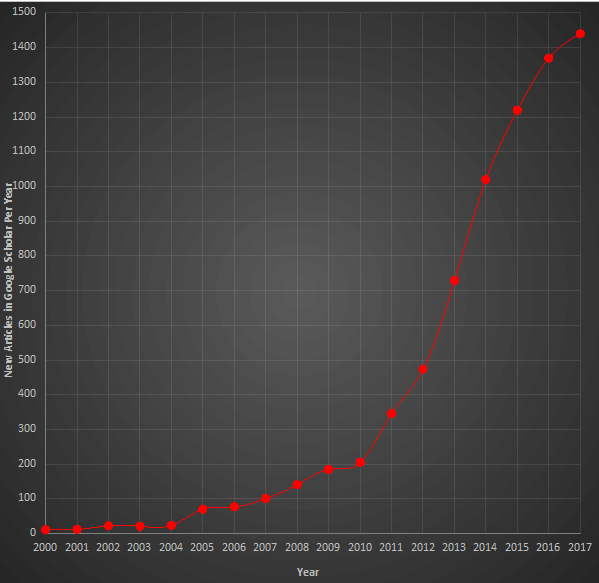In the last 17 years, the concept of open source hardware has erupted in ivory towers throughout the world. Now more than 1,000 articles are written on the topic every year.
Mainstream Academia Embraces Open Source Hardware
Growth in research citations proves that academics with an interest in open hardware are no longer alone.
 Dr. Joshua PearceTwenty years ago, even staunch proponents of free and open source software like Richard Stallman questioned the social imperative for free hardware designs. Academics had barely started to consider the concept; the number of papers coming out annually on the topic were less than could be counted on someone's fingers.
Dr. Joshua PearceTwenty years ago, even staunch proponents of free and open source software like Richard Stallman questioned the social imperative for free hardware designs. Academics had barely started to consider the concept; the number of papers coming out annually on the topic were less than could be counted on someone's fingers.
Not anymore!
Not only has the ethical authority of Stallman embraced free hardware and free hardware design, but so has the academic community. Consider the graph below, which shows the number of articles on open source hardware indexed by Google Scholar each year from 2000 to 2017.
As I previously wrote, Elsevier, the largest academic publisher in the world, is publishing HardwareX, a new open access journal to help accelerate the distribution of low-cost, high-quality open source scientific hardware. There is also the Journal of Open Source Hardware published by Ubiquity Press, PLOS One from the Public Library of Science, and numerous titles from MDPI such as Designs, all of which publish free, open access, open source hardware articles.
 Academic interest in open source hardware, 2000-2017 Image by Joshua Pearce, CC BY
Academic interest in open source hardware, 2000-2017 Image by Joshua Pearce, CC BY
In addition, many conventional journals are publishing open hardware designs and analysis of open hardware projects. For example, this year more than 120 articles have already covered the open source RepRap 3D printing project. Libre hardware has gone mainstream, with even the authority of the U.S. National Academy of Engineering dedicating a special issue of its magazine to the topic last year.
The curve above appears roughly exponential. This indicates that not only is open hardware established in academia, but it is a hot and growing topic that will have a substantial impact.
Why should non-academics care?
For those living outside the ivory tower, it may not be immediately obvious how a bunch of professors writing about libre hardware will influence their lives.
Please let me explain.
Professors are evaluated at most large schools primarily on the quality of their research. This is based on: 1) external grant income, 2) graduate-level (PhD and master's) degrees awarded, 3) publications in peer-reviewed journals and the prestige of those publications, and 4) citations—that is, the number of times a paper is referenced by others. This last number is perhaps the most important for determining a professor's intellectual impact.
In 1999, it was challenging for a young, untenured professor to enter the field of open source hardware because it was too immature to potentially offer a high number of citations, as almost no one was working on it. This acted as an artificial barrier that prevented the most aggressive faculty from participating. Instead, the field was led by the old and secure and the idealists.
As you can see from the graph above, this barrier has been smashed by those open hardware pioneers. Now we can welcome the pragmatic and the strategic academics to Team Libre. Today, due to the rate of free and open source hardware papers being published, it is now relatively easy for academics to dedicate their careers to advancing free hardware. These professors can expect to be rewarded with high citation rates from their rapidly growing academic peers.
This means we can expect a lot more growth, as most academics, who have already dedicated their lives to information sharing, are familiar with the ethics behind the open source hardware culture. In addition, there is a well-established "gift culture" in the tenure process. Professors are judged by how much information they share (and how valuable that shared information is). Finally, making valuable equipment open source is a strategic move for professors who want to garner citations when others use and cite it for years to come. For these and other reasons, open source hardware is an extremely good fit for academics, as open source hardware can help build professors' tenure packages in research, teaching, and service and continue to bolster their academic careers after tenure.
The payoff for society is a high return on investment for accelerated and improved research and development. Many scientists are already focused on making open source equipment and even creating entirely open source labs. This drives down the cost of science and accelerates development of technology.
This trend can pick up steam as taxpayer-funded science results are published by young professors as free and open hardware. This can drive up the quality while driving down the cost of just about everything …which is good for just about everyone, even those who have never set foot on a college campus.
- Tags:
- Academic publishers
- Designs
- Elsevier
- Google Scholar
- HardwareX
- high return on investment
- information sharing
- Joshua Pearce
- Libre hardware
- MDPI
- Michigan Tech in Open Sustainability Technology (MOST)
- open access (OA)
- Open Access Journal
- Open Hardware
- open hardware projects
- open source equipment
- open source hardware
- open source hardware culture
- open source labs
- open source scientific hardware
- PLOS ONE
- Public Library of Science
- RepRap 3D printing project
- Richard Stallman
- Ubiquity Press
- US National Academy of Engineering
- Login to post comments
